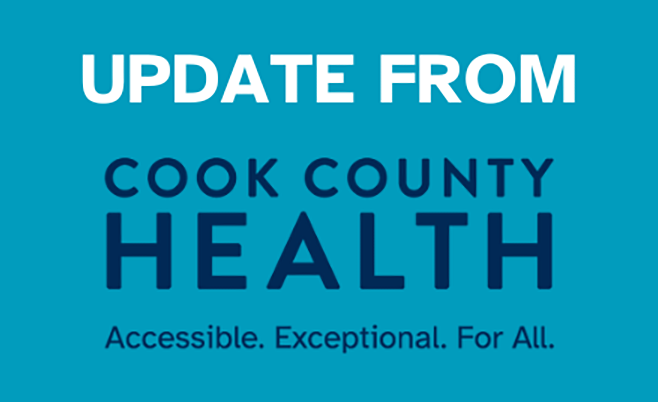August 31 is International Overdose Awareness Day. On this day, Cook County Health recognizes and remembers those who have lost their lives to the drug overdose epidemic.
In 2022, the Cook County Medical Examiner’s Office confirmed 2,000 opioid overdose deaths, breaking the previous record of 1,935 set in 2021. More than 91 percent of the opioid overdose deaths involved fentanyl.
At Cook County Health, a multidisciplinary team of physicians, nurses, social workers, public health experts, recovery coaches and other health care workers are approaching substance use disorder (SUD) care from a variety of directions.
SUD Treatment at Cook County Health
CCH offers Medications for Addiction Treatment (MAT) and recovery support services at all of its community health centers across Cook County so that patients can receive integrated medical and behavioral health services with the same care team.
“At Cook County Health, we believe SUD is a complex health condition – similar to high blood pressure or diabetes – and it can be equally difficult to treat,” said Dr. Claudia Fegan, Chief Medical Officer, Cook County Health. “And just as we use a multi-disciplinary approach to treat other medical conditions, we must use the same comprehensive methods to care for those struggling with SUD.”
CCH also operates The Bridge Clinic, a low-barrier entry or re-entry point into SUD care. It is located in the Ruth M. Rostein Core Center and welcomes walk-in patients seeking SUD care, and also provides telehealth services.
“The goal of the Bridge clinic is to break down barriers for patients to engage in SUD care and provide overdose prevention tools,” said Dr. Juleigh Nowinski, Physician Advisor for the Substance Use Disorder/Medications for Addiction Treatment Program at Cook County Health. “Waitlists, transportation, navigating complex care systems – these issues can derail a patient’s intention to start their path towards recovery. The Bridge Clinic aims to meet patients where they are at with immediate access to care when they are ready.”
Care is patient-centered and team-based. A medical provider is available to address substance use disorder needs, including starting medications for addiction treatment. Primary care and psychiatric care services are available directly or via linkage. A recovery coach and community health worker provide critical recovery support services, including motivational enhancement, addressing myths regarding MAT, helping the patient celebrate early victories such as cutting down on substance use, addressing transportation barriers, and providing warm handoffs to residential treatment providers.
In 2021, Cook County Health received a $2.6 million grant from SAMSHA to expand the clinic’s capacity.
Work at Cook County Jail
CCH’s correctional health department, Cermak Health Services at the Cook County Jail, has the only SAMSHA-Certified Opioid Treatment Program (OTP) within a correctional facility in the State of Illinois, and one of the few in the nation. This means that Cermak Health Services can provide MAT, the gold standard of SUD care, to patients at the Cook County Jail. Cermak Health Services provides MAT care to 700-1,000 patients at the jail each year.
Cermak Health Services offers all three FDA-approved MAT medications (methadone, buprenorphine (suboxone®), and extended-release naltrexone (Vivitrol®) and uniquely patients can choose which medication will best support their recovery, in conjunction with their provider.
Patients receive a health screening at intake, where they are assessed by CCH staff for SUD and potential withdrawal. This is the first of several touchpoints where patients with SUD receive care, as well as information about MAT and overdose prevention.
“The jail is a microcosm of our communities where we are seeing increasing rates of substance use disorders,” said Dr. Priscilla Ware, Chair of Correctional Health and Medical Director of Cermak Health Services. “It is essential that we use the opportunity of a life-altering detention to engage with patients to support their recovery.”
Additionally, Cook County Health has collaborated with the Cook County Sheriff’s Office to make the opioid reversal medication, naloxone (Narcan) widely available across the compound both via medical staff and Sheriff’s officers on the tiers.
Medical staff have trained Sheriff’s officers on how to identify early signs of overdose to respond as quickly as possible to a potential overdose.
Cermak Health Services staff also provide training on Narcan and offer Narcan kits for patients who are leaving the jail. Cook County Health has distributed more than 7,600 naloxone kits to patients being released from jail since 2016.
Harm Reduction: A Public Health Approach
“Harm reduction is a core public health approach that decreases fatalities and increases corridors to care for those suffering from substance use disorder,” said Cook County Department of Public Health (CCDPH) Chief Operating Officer, Dr. LaMar Hasbrouck.
Harm reduction strategies include: deflection training for law enforcement to keep people out of jail for minor drug offenses by referring for mental health and treatment services; training health professionals and first responders to treat wounds earlier so infections don’t advance; education and distribution of safe supplies such as fentanyl test strips; referrals to treatment; prevention education; and easy access to naloxone, a life-saving nasal spray that can reverse the effects of an opioid overdose.
Cook County Health is offering naloxone for free at many of its health centers, as well as the emergency departments at Stroger and Provident Hospitals.
Visit the CCDPH website at www.getnaloxonecookcounty.com to learn more about naloxone, deflection, how to recognize and respond to an overdose, order and use fentanyl test strips and get treatment.

